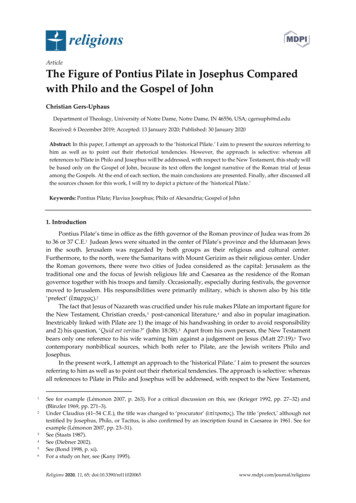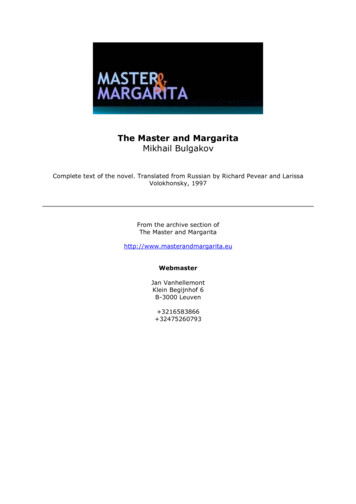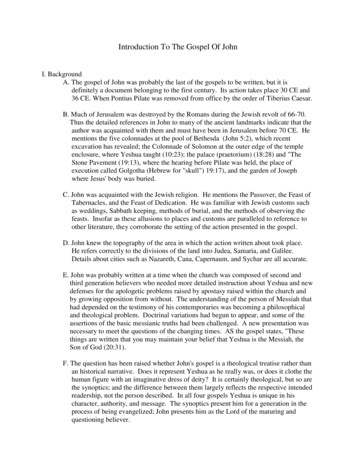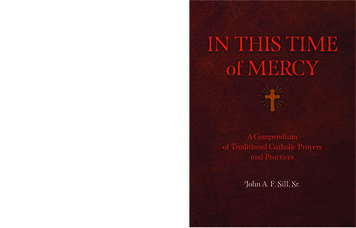
Transcription
ArticleThe Figure of Pontius Pilate in Josephus Comparedwith Philo and the Gospel of JohnChristian Gers-UphausDepartment of Theology, University of Notre Dame, Notre Dame, IN 46556, USA; cgersuph@nd.eduReceived: 6 December 2019; Accepted: 13 January 2020; Published: 30 January 2020Abstract: In this paper, I attempt an approach to the ‘historical Pilate.’ I aim to present the sources referring tohim as well as to point out their rhetorical tendencies. However, the approach is selective: whereas allreferences to Pilate in Philo and Josephus will be addressed, with respect to the New Testament, this study willbe based only on the Gospel of John, because its text offers the longest narrative of the Roman trial of Jesusamong the Gospels. At the end of each section, the main conclusions are presented. Finally, after discussed allthe sources chosen for this work, I will try to depict a picture of the ‘historical Pilate.’Keywords: Pontius Pilate; Flavius Josephus; Philo of Alexandria; Gospel of John1. IntroductionPontius Pilate’s time in office as the fifth governor of the Roman province of Judea was from 26to 36 or 37 C.E.1 Judean Jews were situated in the center of Pilate’s province and the Idumaean Jewsin the south. Jerusalem was regarded by both groups as their religious and cultural center.Furthermore, to the north, were the Samaritans with Mount Gerizim as their religious center. Underthe Roman governors, there were two cities of Judea considered as the capital: Jerusalem as thetraditional one and the focus of Jewish religious life and Caesarea as the residence of the Romangovernor together with his troops and family. Occasionally, especially during festivals, the governormoved to Jerusalem. His responsibilities were primarily military, which is shown also by his title‘prefect’ ( ).2The fact that Jesus of Nazareth was crucified under his rule makes Pilate an important figure forthe New Testament, Christian creeds, 3 post-canonical literature, 4 and also in popular imagination.Inextricably linked with Pilate are 1) the image of his handwashing in order to avoid responsibilityand 2) his question, ‘Quid est veritas?’ (John 18:38). 5 Apart from his own person, the New Testamentbears only one reference to his wife warning him against a judgement on Jesus (Matt 27:19).6 Twocontemporary nonbiblical sources, which both refer to Pilate, are the Jewish writers Philo andJosephus.In the present work, I attempt an approach to the ‘historical Pilate.’ I aim to present the sourcesreferring to him as well as to point out their rhetorical tendencies. The approach is selective: whereasall references to Pilate in Philo and Josephus will be addressed, with respect to the New Testament,123456See for example (Lémonon 2007, p. 263). For a critical discussion on this, see (Krieger 1992, pp. 27–32) and(Blinzler 1969, pp. 271–3).Under Claudius (41–54 C.E.), the title was changed to ‘procurator’ ( ). The title ‘prefect,’ although nottestified by Josephus, Philo, or Tacitus, is also confirmed by an inscription found in Caesarea in 1961. See forexample (Lémonon 2007, pp. 23–31).See (Staats 1987).See (Diebner 2002).See (Bond 1998, p. xi).For a study on her, see (Kany 1995).Religions 2020, 11, 65; ons
Religions 2020, 11, 652 of 24this study will be based only on the Gospel of John, because its text offers the longest narrative of theRoman trial of Jesus among the Gospels. At the end of each section, the main conclusions arepresented. Finally, after having discussed all the sources chosen for this work, I will try to depict apicture of the ‘historical Pilate.’2. Pilate in PhiloThe earliest literary reference to Pilate can be found in Philo’s work Embassy to Gaius (Legatio adGaium) in paragraphs 299 and 304.7 The part that is of interest to us is the following:(299) I [sc. Agrippa I] can also tell you of something on which he prided himself, although Iexperienced countless sufferings during his lifetime. But you love and respect the truth. Pilate was anofficial who had been appointed procurator of Judaea. With the intention of annoying the Jews ratherthan of honouring Tiberius, he set up gilded shields in Herod’s palace in the Holy City. They bore nofigure and nothing else that was forbidden, but only the briefest possible inscription, which statedtwo things—the name of the dedicator and that of the person in whose honour the dedication wasmade. (300) But when the Jews at large learnt of his action, which was indeed already widely known,they chose as their spokesmen the king’s four sons, who enjoyed prestige and rank equal to that ofkings, his other descendants, and their own officials, and besought Pilate to undo his innovation inthe shape of the shields, and not to violate their native customs, which had hitherto been invariablypreserved inviolate by kings and emperors alike. (301) When Pilate, who was a man of inflexible,stubborn and cruel disposition, obstinately refused, they shouted, ’Do not cause a revolt! Do not causea war! Do not break the peace! Disrespect done to our ancient Laws brings no honour to the Emperor.Do not make Tiberius an excuse for insulting our nation. He does not want any of our traditions doneaway with. If you say that he does, show us some decree or letter or something of the sort, so that wemay cease troubling you and appeal to our master by means of an embassy.’ (302) This last remarkexasperated Pilate most of all, for he was afraid that if they really sent an embassy, they would bringaccusations against the rest of his administration as well, specifying in detail his venality, his violence,his thefts, his assaults, his abusive behaviour, his frequent executions of untried prisoners, and hisendless savage ferocity. (303) So, as he was a spiteful and angry person, he was in a serious dilemma;for he had neither the courage to remove what he had once set up, nor the desire to do anything whichwould please his subjects, but at the same time he was well aware of Tiberius’ firmness on thesematters. When the Jewish officials saw this, and realized that Pilate was regretting what he had done,although he did not wish to show it, they wrote a letter to Tiberius, pleading their case as forcibly asthey could. (304) What words, what threats Tiberius uttered against Pilate when he read it! It wouldbe superfluous to describe his anger, although he was not easily moved to anger, since his reactionspeaks for itself. (305) For immediately, without even waiting until the next day, he wrote to Pilate,reproaching and rebuking him a thousand times for his new-fangled audacity and telling him toremove the shields at once and have them taken from the capital to the coastal city of Caesarea (thecity named Sebaste after your great-grandfather), to be dedicated in the temple of Augustus. This wasduly done. In this way both the honour of the Emperor and the traditional policy regarding Jerusalemwere alike preserved.8The incident described in the Embassy is found within a letter from Agrippa I to Emperor GaiusCaligula, trying to persuade him to respect the Jewish Law by referring to those preceding him and,therefore, to dissuade him from setting up his statue in the Jerusalem Temple. 9 For fruitful work onthe question of Pilate’s character, we have to be aware of this literary composition. Thus, I willdiscuss, briefly, its circumstances and particularities in the following paragraphs.1078910See (Borgen et al. 1997).(Philo 1970, par. 299–305 [trans. Smallwood, pp. 128–31]).See (Lémonon 2007, p. 189). The whole letter can be found in (Philo 1970, par. 276–329 [trans. Smallwood, pp.122–37]).For a more detailed view on this see also (Smallwood 1976, pp. 220–55).
Religions 2020, 11, 653 of 242.1. Historical Background of the EmbassyThe Embassy is an invective against Emperor Gaius, with episodes showing, according to Philo,his hostility toward the Jews. Philo refers to two attacks made on them during the governorship ofGaius: the anti-Jewish riots in Alexandria in the summer of 38 C.E. and Gaius’ attempt to dedicatethe Temple in Jerusalem to the imperial cult. 11Although the city of Alexandria was dominated by Greek citizens, its Jewish Diasporacommunity was a large one and needed some definite organization beyond its division intosynagogues. In fact, the Jews in Alexandria “were constituted as a quasi-autonomous civic unit,generally known as a by modern, if not always by ancient, writers.” 12 From the time ofPtolemy I, the Jews had the right of residence in Alexandria, but, concerning their status ofcitizenship, they occupied only an intermediate position between the Greek citizens and theEgyptians who were totally without privileges. Having coexisted peacefully during the time ofPtolemaic dominance, hostility began with the annexation of Egypt in 30 B.C.E. by the Romans, butit did not take an active form for over sixty years. It seems that this hostility had its roots primarilyin the complications introduced into the Alexandrian situation by the Roman annexation and,originally, was not based on hatred against Jews in general. 13 By the 30s C.E., after a party of Greeknationalists had arisen in Alexandria, the passive hostility changed into a brutal anti-Semitism andfinally culminated in the riots against the Jews, which followed the visit of Agrippa I to Alexandriain August 38 C.E. First, a mob gathered in the gymnasium brought out a succession of gibes againstthe king.14 Because this went unpunished by the prefect Flaccus, the Greeks mocked him by dressingup a certain lunatic named Carabas as a king.15 Furthermore, being aware of the prefect’s impotence,the Greek mob deprived the Jews of the use of their synagogues.16 It was not until Flaccus’ suddenarrest by soldiers arriving from Rome in the autumn of 38 C.E. that conditions returned to normal forthe Alexandrian Jews.17As a consequence of these troubles, “three delegates were chosen by each of the factions andappeared before Gaius.” 18 While waiting to be received by the emperor in order to defend theinterests of the Alexandrian Jews in light of their maltreatment by the Greeks, the Jewish embassylearned that Gaius had ordered that a statue be set up and named after Zeus in the JerusalemTemple.19 Finally, after being heard by him twice, Gaius left them within, saying: “I think that thesemen are not so much criminals as lunatics in not believing that I have been given a divine nature.”20In summary, the embassy to Gaius was not successful. Philo himself says so clearly.21 Thus, Imay ask the question: for what purpose did Philo publish his Embassy to Gaius?1112131415161718192021See Smallwood, Introduction to (Philo 1970, p. 3).(Smallwood 1976, p. 225). A further discussion on this terminus technicus will not be done here. For this, see also(Smallwood 1976, pp. 225–35).See (Smallwood 1976, p. 233). According to her, the trouble probably arose over the question of the civic positionof the Jews. See (Smallwood 1976, p. 234).(Philo 1960, par. 32–4 [trans. Colson, pp. 318–21]).(Philo 1960, par. 36–9 [trans. Colson, pp. 322–5]).(Philo 1960, par. 41–53 [trans. Colson, pp. 324–33]).(Philo 1960, par. 102–24 [trans. Colson, pp. 358–71]). According to Philo, Emperor Gaius decided on it afterhaving received a letter from Agrippa I from Alexandria explaining Flaccus’ suppression. For a furtherdiscussion on this letter, see the following paragraph.(Josephus 1965, XVIII, par. 257 [trans. Feldmann, pp. 152–3]). This voyage to Rome probably took place in thewinter of 39–40 C.E.See (Philo 1970, par. 187–9 [trans. Smallwood, pp. 100–1]).(Philo 1970, par. 367 [trans. Smallwood, pp. 144–5]). The two audiences given to them are told in (Philo 1970,par. 349–67 [trans. Smallwood, pp. 140–5]). Josephus mentions only the second hearing in (Josephus 1965, XVIII,par. 257–60 [trans. Feldmann, pp. 152–5]). For a more detailed study on this part, see (Smallwood 1976, pp. 242–5).See (Philo 1970, par. 368–73 [trans. Smallwood, pp. 144–7]).
Religions 2020, 11, 654 of 242.2. The Letter of Agrippa—Considerations on Philo’s Political RhetoricIn order to find a reliable answer to this, we should keep in mind that the Embassy was writtenafter Gaius’ death in 41 C.E.,22 probably in the early part of Claudius’ reign, in order “to persuade thenew Emperor [sc. Claudius] not to follow the policies of Gaius but those of his predecessors, Augustusand Tiberius,”23 because this is relevant to his success as emperor. On a higher level, the whole workcontains a scheme similar to this. Furthermore, Philo’s so-called historical writings, comprising theEmbassy and the Flaccus, are marked by rhetorical and theological concerns. 24 In particular, this isprominent in his treatment of the characters and actions of Roman Emperors and officials, leading usback to our subject, Pilate.Agrippa’s letter to Gaius in the Embassy includes the only reference to Pilate in Philo’s works.However, is it really a work of Agrippa himself? First of all, from a stylistic point of view, the letterfits with Philo’s text of the whole Embassy. Secondly, ancient literature offers examples of discoursesthat were not delivered by those to whom they were dedicated. 25 Despite these reservationsconcerning an Agrippian authorship of this letter presented in the Embassy, the possible existence ofa real letter from him in that conflicting situation cannot be totally rejected; 26 however, whether thehistorical Agrippa wrote one is unknown to us. 27 Certainly, the one in the Embassy is a Philoniancomposition.28In the Embassy (and also in the Flaccus), Philo makes use of several rhetorical themes, which Iwill take briefly into consideration with regard to the relevant passage cited above: 29(1) He stresses that the Jews are loyal and peaceful members of the Roman Empire, striving for “respect for theEmperor” as well as “obedience to [their] hallowed laws.”30 They show respect to their emperor, but theycannot tolerate any disrespect toward their own laws. The incident of the Gilded Shields shows that “thereis no fundamental conflict between these two positions,”31 because by removing them, “both the honour ofthe Emperor and the traditional policy regarding Jerusalem were alike preserved.”32 According to Philo, itis obvious that dishonor shown toward Jewish Law is therefore connected with dishonor to the emperor,33222324252627282930313233The Embassy mentions events after Gaius’ time as Roman Emperor. See (Philo 1970, par. 206 [trans. Smallwood,pp. 106–7]).(Bond 1998, p. 33). For this view, see also (Lémonon 2007, pp. 190–1). That is why (Schwartz 1983, p. 32) speakscorrectly of a “context that is doubly apologetic, reflecting Agrippa’s situation in relation to Caligula, and Philo’sin relation to Claudius.”See also (Bond 1998, p. 25). See also (Thatcher 1995, p. 218): “Legatio may be ‘history,’ but it is history in serviceof a rhetorical agenda.”See (Lémonon 2007, p. 191), particularly fn. 17. For an ongoing study on this see also the works of (Stowers 1986)and (Malherbe 1986).See (Lémonon 2007, p. 191): “Ces réserves étant faites, on ne peut pas refuser l’existence d’une lettre du roiAgrippa à Gaius dans les circonstances dramatiques narrées par Philo.”For an ongoing discussion on this, see (Zeitlin 1965, pp. 22–31).See (Thatcher 1995, p. 216) and Smallwood, Commentary on (Philo 1970, par. 276, pp. 291–2). This conclusionwill be sufficient for our further considerations on Pilate. Furthermore, Lémonon mentions in his work three—convincing—reasons for the supposition that Philo probably appears to be inspired by thoughts that wereoriginally related to Agrippa. For this see (Lémonon 2007, pp. 191–2). However, Josephus does not know of sucha letter. He speaks of Agrippa’s appeal to Gaius in the context of a banquet in Rome. See (Josephus 1965, XVIII,par. 289–97 [trans. Feldmann, pp. 168–73]). See also the summary of (Zeitlin 1965, p. 31): “The letter of Agrippato Gaius, as recorded by Philo, was composed by Philo in accordance with his theology. The speech of Agrippato Gaius, as recorded by Josephus, was composed by Josephus in the spirit of the historiography of the Greeks.”See also (Bond 1998, pp. 33–6).(Philo 1970, par. 236 [trans. Smallwood, pp. 114–5]).(Bond 1998, p. 34).(Philo 1970, par. 305 [trans. Smallwood, pp. 130–1]).See (Philo 1970, par. 301 [trans. Smallwood, pp. 128–9]).
Religions 2020, 11, 655 of 24which is recognized immediately by an emperor such as Tiberius.34 Therefore, Pilate’s action of setting upthe shields can only have been “with the intention of annoying the Jews rather than of honouring Tiberius.”35(2) As already mentioned above, concerning Philo’s motivation for publishing the Embassy, he tries to persuadeClaudius not to follow the policy of Gaius with regard to the Jews, but rather those policies of Augustus36and Tiberius37, described by Philo as men of high moral standing, showing respect and honour towardJewish Law and traditions and whose long reigns were peaceful and prosperous. Contrary to those is thedepiction of Gaius38 as an enemy of the Jews.(3) The fate of Flaccus, being removed from office, shows in Philo’s works what happens to an official actingagainst Jewish Law. 39 Furthermore, the Embassy includes references to a greater number of Jews in theempire who would certainly rise up in the case of offense to their religion.40 The warnings of the spokesmenreproduced by Philo41 fit with this theme and, therefore, give a clear indication that such an action—suchas the one involving the shields by Pilate—could be followed by a revolt throughout all the empire.42Having analyzed these rhetorical tendencies in Philo’s Embassy (and in the Flaccus), I will nowtake into consideration how Pilate is presented to us in the incident of the Gilded Shields. Philo’spolitical rhetoric enhances his theology and vice versa, and both aspects influence his portrayal ofPilate.43 Keeping this in mind, I will attempt to provide some concluding remarks on the ‘historicalPilate’ in the last paragraph of this section.2.3. Philo’s Presentation of Pilate in the Incident of the Gilded ShieldsWith regard to Embassy 299–305, Philo’s depiction of Pilate conforms to the picture of a Romanofficial disrespecting the Jews and their law. 44 He is described as intending to annoy the Jews( ) rather than honoring Tiberius ( ). His disposition is3435363738394041424344See (Philo 1970, par. 304–5 [trans. Smallwood, pp. 130–1]).(Philo 1970, par. 299 [trans. Smallwood, pp. 128–9]).For Augustus, see for example: (i) (Philo 1960, par. 74 [trans. Colson, pp. 342–3]): “savior and benefactor” or (ii)(Philo 1970, par. 143 [trans. Smallwood, pp. 90–1]): “What about the Emperor whose every virtue outshonehuman nature, who through the greatness of his imperial rule and of his valour alike became the first to bear thename ‘Augustus,’ who did not receive the title by inheritance from his family as part of a legacy, but was himselfthe source of the reverence paid to his successors also?” or (iii) (Philo 1970, par. 309 [trans. Smallwood, pp. 130–1]): “Now what about your great-grandfather, the best of all the Emperors who have ever lived, who was thefirst to be called Augustus because of his goodness and position, and who spread peace everywhere by land andsea to the ends of the earth?”For Tiberius, see for example: (i) (Philo 1970, par. 141 [trans. Smallwood, pp. 88–9]): “He [sc. Tiberius] held swayover land and sea for twenty-three years without allowing any spark of war to smoulder in Greek or barbarianlands, and he gave peace and the blessings of peace to the end of his life with ungrudging bounty of hand andheart.” or (ii) (Philo 1970, par. 298 [trans. Smallwood, pp. 128–9]): “Then what about your other grandfather,Tiberius Caesar? Was his policy not clearly the same? At any rate, during the twenty-three years of his principatehe safeguarded the Temple ritual which had been handed down from the distant past, and did not abolish ordisturb a single item of it.”For Gaius, see for example: (Philo 1970, par. 77; 133; 162; 201 [trans. Smallwood, pp. 72–3; 86–7; 94–5; 104–5]):“blasphemous deification of himself;” “felt an indescribable hatred for the Jews;” “swelled with pride;” “howhostile he was towards the whole Jewish race.”See (Philo 1960, par. 116 [trans. Colson, pp. 366–7]): “It [sc. Flaccus’ arrest] was caused, I [sc. Philo] am convinced,by his treatment of the Jews, whom in his craving for aggrandisement he had resolved to exterminate utterly.”See for example the issue of Gaius’ plan of erecting a statue in Jerusalem in (Philo 1970, par. 217 [trans.Smallwood, pp. 108–11]): “So he [sc. Gaius] was naturally very much afraid that, when these Jews heard of theproposed new dedication, they would suddenly invade and encircle him, some from one side and some fromthe other, and then join forces and maltreat those whom they had surrounded.”See (Philo 1970, par. 301 [trans. Smallwood, pp. 128–9]). This passage has already been cited above.Regarding Philo’s rhetorical aims—and the relative smallness of Pilate’s offense—these warnings have probablybeen exaggerated. See also (Bond 1998, pp. 33–5).See (Bond 1998, p. 26).For the following analysis, see also (Bond 1998, pp. 31–3).
Religions 2020, 11, 656 of 24inflexible ( ), stubborn ( ), cruel ( ), spiteful ( ), and angry( ), without having the courage to do anything to please his subjects. 45 Concerning hisadministration, it is characterized by venality ( ), violence ( ), his thefts ( ), hisassaults ( ), his abusive behavior ( ), his executions of untried prisoners ( , ),and his savage ferocity ( , ). In order to get nearer to the ‘real Pilate,’ we have toanswer the question of whether these adjectives are used in Philo’s historical writings (the Embassyand the Flaccus) exclusively to describe him or if there are indications for a common use.46 First of all, none of these adjectives are used only for Pilate. The charge of annoying the Jewsrather than honoring the emperor is also an accusation against the Alexandrian mob.47 The word is also used for captors allowing their captives to go for money, not mercy; 48 describes the evil speech of the Alexandrians; 49 and is referred to two times in order todescribe the character of Gaius.50 Parallels to the description of Pilate’s administration can also befound as follows: is used to describe the bribes given to Flaccus’ accusers by Isodorus;51 , , and are also used to describe Flaccus; 52 and , 53 , 54 ,55 ,56 ,57 ,58 and 59 are used to describe the Alexandrian crowdand their leaders. Furthermore, some of these words ( , 60 , 61 , 62 , 63 ,64 ,65 66) are used to describe Gaius. Finally, Tiberius rebukes Pilate for hisnovel action ( ).67 It is the same word that is also used by Philo in order to describe thecruelty of the Alexandrian mob,68 Gaius’ statue,69 and his acts of megalomania.70To sum up, Philo’s presentation of Pilate is not based on a personalized attack but, rather, ongeneral terms that are used by him regularly to describe those who do not respect the Jews, inparticular Gaius and the Alexandrians. 71 Moreover, our conclusion is supported by a passage fromthe Flaccus, giving a general description of a corrupt governor. The text, which refers even in Greekto some of the keywords analyzed above, is as 666768697071Greek: .This question is also posed by Bond and McGing. See (Bond 1998, p. 31) and (McGing 1991, p. 433).See (Philo 1960, par. 51 [trans. Colson, pp. 332–3]).See (Philo 1960, par. 60 [trans. Colson, pp. 336–7]).See (Philo 1960, par. 35 [trans. Colson, pp. 320–1]).See (Philo 1960, par. 182 [trans. Colson, pp. 398–9]) and (Philo 1970, par. 350 [trans. Smallwood, pp. 140–1]).See (Philo 1960, par. 140 [trans. Colson, pp. 378–9]).See (Philo 1960, par. 173; 103; 54; 189 [trans. Colson, pp. 394–5; 358–9; 332–3; 402–3]).See (Philo 1960, par. 40; 59; 95; 136 [trans. Colson, pp. 324–5; 334–5; 354–5; 376–7]).See (Philo 1960, par. 56–7; 62; 69 [trans. Colson, pp. 334–5; 336–7; 340–1]) and (Philo 1970, par. 122; 129 [trans.Smallwood, pp. 84–5; 86–7]).See (Philo 1960, par. 59; 71–2; 96 [trans. Colson, pp. 34–5; 340–1; 354–7]) and (Philo 1970, par. 128 [trans.Smallwood, pp. 84–7]).See (Philo 1970, par. 134 [trans. Smallwood, pp. 86–9]).See (Philo 1960, par. 21; 95 [trans. Colson, pp. 314–5; 354–5]).See (Philo 1960, par. 59; 66 [trans. Colson, pp. 334–7; 338–9]).See (Philo 1960, par. 19 [trans. Colson, pp. 312–3]).See (Philo 1970, par. 105 [trans. Smallwood, pp. 78–81]).See (Philo 1970, par. 344 [trans. Smallwood, pp. 138–9]).See (Philo 1970, par. 66 [trans. Smallwood, pp. 70–1]).See (Philo 1960, par. 182 [trans. Colson, pp. 398–9]).See (Philo 1970, par. 341 [trans. Smallwood, pp. 138–9]).See (Philo 1970, par. 260 [trans. Smallwood, pp. 120–1]).See (Philo 1970, par. 260 [trans. Smallwood, pp. 120–1]).See (Philo 1970, par. 305 [trans. Smallwood, pp. 130–1]).See (Philo 1960, par. 59 [trans. Colson, pp. 334–5]).See (Philo 1970, par. 217 [trans. Smallwood, pp. 108–9]).See (Philo 1970, par. 348 [trans. Smallwood, pp. 140–1]).See also (McGing 1991, p. 433) and (Bond 1998, p. 32).
Religions 2020, 11, 657 of 24(105) Some, indeed, of those who held governorships in the time of Tiberius and his father Caesar,had perverted their office of guardian and protector into domination and tyranny and had spreadhopeless misery through their territories with their venality [ ], robbery [ ], unjustsentences, expulsion and banishment of quite innocent people, and execution of magnates withouttrial [ ]. But these people on their return to Rome, after the termination of their time of office,had been required by the emperor to render an account and submit to scrutiny of their doings,particularly when the aggrieved cities sent ambassadors.72Apart from these three identical words, the cited passage includes even a reference to anembassy that will inform the emperor about the misdeeds of the (corrupt) governor. 73 Historically,Pilate may have appeared in the eyes of the Jews as an inflexible, stubborn, cruel, and violentgovernor. 74 Because Pilate acted against Jewish Law—because he wanted to show loyalty toTiberius—he is described by Philo “in precisely the same terms as other ‘enemies’ of the Jews: Gaius,Flaccus [ ] and the Alexandrians,”75 doubtlessly exaggerated according to his theological rhetoric.76However, his action surely caused offense in some way and, therefore, is not only simply Philonianrhetoric. 77 Thus, it should be possible to come to a plausible reconstruction of the historical eventbehind Embassy 299–305.2.4. Notes on the Historical EventThe question to be answered is the following: Is the incident of the Gilded Shields an exampleof the hypersensitivity of the Jews, or in what way did the shields cause offense against Jewish Law?What was different about these shields ( ) compared, for example, with those set up in theAlexandrian synagogues?78According to Philo, the shields bore no figure79 and nothing else that was forbidden,80 except abrief inscription,81 revealing the name of the dedicator ( ) and that of the person in whosehonor the dedication was made ( ). Thus, the offense lays in the wording of theinscription. 82 Otherwise, if there was not any offense, the whole incident would lose its significance,83and Philo, with regard to his rhetorical aim, would have succeeded only in presenting Jewish727374757677787980818283(Philo 1960, par. 105 [trans. Colson, pp. 360–1]).And that can be regarded as a clear parallel to Pilate’s fear in (Philo 1970, par. 302).Not all characteristics concerning Pilate and his maladministration given by Philo are repeated here. For this,see the analysis above.(Bond 1998, p. 33).See also the statement in (Lémonon 2007, p. 204), concerning the ‘review’ on Pilate’s administration in Embassy,par. 302: “Le texte présente une exagération évidente. La Judée n’aurait pas supporté dix ans un tel gouverneur,et les procuratuers dont les actions ont conduit à la révolte juive sont à peine accusés par Josèphe d’autant deméfaits.” It should be noted that the description of Tiberius as benefactor of the Jews, and particularly hisreaction toward Pilate’s action, in Philo is simply exaggerated, or at least selective, because it does not mention,for example, the expulsion of the Jews from Rome in 19 C.E., which is noted in (Josephus 1965, XVIII, par. 79–83[trans. Feldmann, pp. 56–61]). For further considerations on this, see (Lémonon 2007, pp. 200–2).This is shared by (Thatcher 1995, p. 218). Furthermore, according to (Bond 1998, p. 37), Philo was probably inpossession of some accurate facts, because he was a friend of Agrippa I. See also the statement of (Mason 2005,p. 168): “Nevertheless, where there is smoke there may be fire.”See (Philo 1970, par. 133 [trans. Smallwood, pp. 86–7]). The Greek reference is also .Usually, bore an image of a god or a great man. It corresponds to the Latin clipeus. See (Lémonon 2007, pp.196–7).Greek: .Greek: . It is noteworthy that can also be translated as“necessary inscription.” This translation is also proposed by (Davies 1986, p. 110): “[ ] the word ‘necessary’seems to make fully sufficient sense as a translation.”Now, the difference to those put up in the Alexandrian synagogues becomes clear. Moreover, those we
Keywords: Pontius Pilate; Flavius Josephus; Philo of Alexandria; Gospel of John 1. Introduction Pontius Pilate s time in office as the fifth governor of the Roman province of Judea was from 26 to 36 or 37 C.E. 1 Judean Jews were situated in the center of Pilate s province and the Idumaean Jews in the south.










